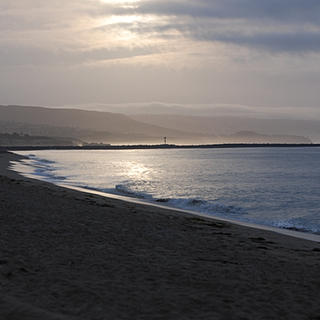Species Spotlight: Vaquita
- OC Habitats
- Aug 16, 2021
- 3 min read

The vaquita (Phocoena sinus) is part of the porpoise family and is the most endangered of the world's marine mammals. They are gray in color and one of the smallest members of the dolphin, whale, and porpoise family, measuring to be about 5 feet long. They have a rounded head with no beak (versus bottlenose dolphins) and have black patches around their eyes and lips. Vaquita feed on fish, cephalopods like squid and octopuses, and crustaceans such as shrimp. They can live to be 21 years old and reach sexual maturity between 3 and 6 years old. They ONLY live in the northern part of the Gulf of California, an area rich in fish and shrimp, where gillnets are often used and are what entangles vaquitas, often leading to them drowning.
The first precise estimate of vaquita abundance was a Mexican-American survey conducted in 1997 that looked at the entire geographic range of where vaquita inhabit and estimated there were 567 individuals. From early acoustic studies in 1997-2008 it was indicated that the species was declining. Another international survey was conducted in 2015 using visual and acoustic surveys that estimated the population was around 59. In May of 2015, there was an emergency gillnet ban (entanglements are the ONLY known threat to the vaquita) and one model indicated that the population decreased 80% between 2011 and 2015. The 2016 Acoustic Monitoring Program estimated that there were approximately 30 vaquitas and that the species is in imminent danger of extinction. In 2019, a report from the Committee for the Recovery of the Vaquita (CIRVA) estimated the vaquita population to be 10 or fewer individuals.

The totoaba, Totoaba macdonaldi (also endemic to the Gulf of CA), fishery has been the most critical in regards to vaquita by-catch from mid 1930-1975 when the fishery was officially closed because of severe overfishing (totoaba are on the Mexican Endangered Species list, on the U.S. Endangered Species list, and is listed by the IUCN Red List as Critically Endangered). Since totoaba and vaquita are similar in size, gillnets set for totoaba pose the highest threat for vaquita. Despite the fishery closure, illegal fishing for totoaba has increased due to the meat, but also the fish being prized for its swim bladder, which is exported to China for a soup ingredient believed to have medicinal value. These are dried and smuggled out of Mexico and sometimes the U.S. too. Fishermen can receive up to $8,500 (higher value on the black market) for each kilogram of swim bladder (equal to 6 months income or more for legal fishing activities). Frozen shrimp consumed locally or exported to the United States can come from the Gulf of California and is listed to Avoid on the Seafood Watch website.
Over the years it has been thought that the vaquita had other threats, such as habitat alteration from reduced flow of the Colorado River, pollution, and reduced fitness from inbreeding. However, vaquitas examined after dying in fishing nets appeared to be feeding normally (not emaciated and no malnutrition), pollutant loads in tissues of bycatch animals were low, and researchers were able to complete a genome sequence and found that the vaquita has survived for 250,000 years at this low level of genetic diversity. So, they will not face an "extinction spiral" where inbreeding leads to a lethal amount of genetic mutations (as seen in previous wolves and panther populations in the U.S.), as the cause of the low diversity is consistent with a naturally rare species. Scientists have also looked at vaquitas recovered from gillnets that were young and had no apparent health issues to indicate inbreeding depression. NOAA Fisheries and its partners have examined the former potential threats to vaquitas, which have all been dismissed. The Mexican government permanently banned gillnet fishing in 2017, but it's extremely hard to enforce. In 2015, the Mexican government began subsidizing local fishermen to halt activities and let the population recover, however payment ended in 2018 forcing many people to resort to illegal fishing to make ends meet. The Chinese government has also increased their involvement with enforcement on the demand side, leading to the totoaba swim bladder trade to plummet in 2018 (though sources say it's still easy to buy). If we can prevent vaquita entanglements, we can prevent this species from going extinct.

You can help by learning about bycatch and avoiding eating seafood that uses gillnets in the Gulf of California & by reporting a violation by calling the NOAA Fisheries Enforcement Hotline at (800) 853-1964 to report a federal marine resource violation (hotline is available 24/7 to anyone in the United States).







Comments